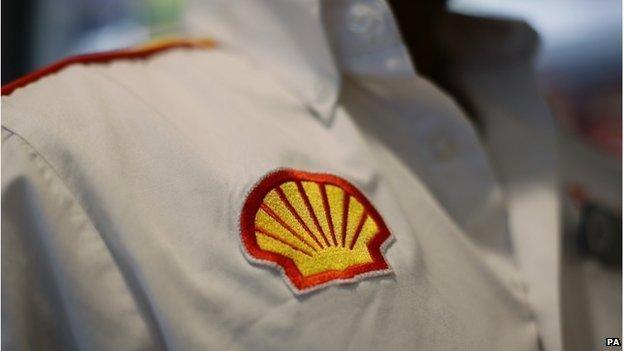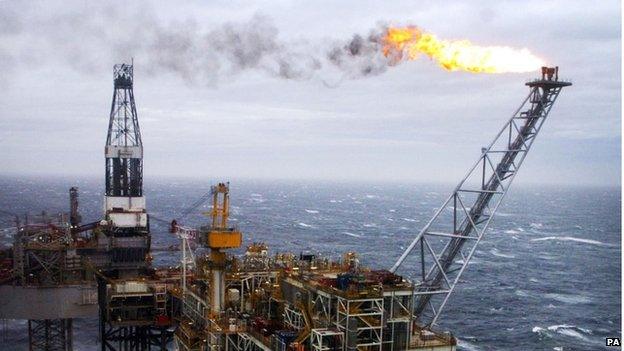Offshore profit slump
- Published

Recovery from recession includes at least three pay-out bonuses for those who own the capital. Competitors have been closed down or taken over. Assets are going cheaply for those feeling acquisitive. And workers are poorly placed to push for higher wages.
So it's no great surprise, after such a long downturn, that profitability is doing rather well. The Office for National Statistics (ONS) has just published figures showing as much.
At net return on capital of 11.9% last year, UK plc (excluding the finance sector) is at its most profitable this century, and comparable numbers don't go much further back than that. That was a rise from the 9.7% low point for profitability in 2009.
The ONS breaks down profitability figures by sector, and the service sector looks particularly strong. Its net profitability was at 16.7% during last year. It peaked in the third quarter at 18.4%.
Exploration risks
But the sector that has most to worry about is the UK Continental Shelf. That is, the offshore oil and gas industry.
This should be no great surprise to those who have watched the price of Brent crude fall in recent months. But the evidence is described by industry group Oil and Gas UK as "shocking".
At 10.4% net rate of return in the final quarter of 2014, it doesn't look too bad by comparison with other sectors. But the oil and gas sector thrives on big profits, for which it pays heavily in tax and without which it doesn't take the necessary exploration risks.
This is also an industry which deploys its capital where it can get the best return. And Oil and Gas UK's Malcolm Webb points out that the UK is now at the bottom of the league table for profitability.
The ONS figures show that offshore profitability halved from the first quarter of last year to the last. And the final quarter hadn't yet seen the worst of the oil price fall.
Offshore firms registered a 15.7% net rate of return for the whole year - by far the lowest level since the ONS data began. Of the previous 13 years this century, profitability only fell below 30% on three other occasions, and was above 40% in 2008 and 2011.
Having secured what it wanted from the UK Budget in tax cuts, the industry is now looking for cost cuts of at least 40% per unit produced, making the argument that that scale of change is necessary to secure a sustainable future.
Even if the price rose above $100 per barrel, it is argued, that wouldn't be enough without tackling costs (as I write, it's trading at $56.64).
And of course, cost cutting means a challenge to the workforce, with the threat of strikes hanging over the industry as it pushes for changes to pay and conditions.
"No guarantees"
With assets priced attractively, the Royal Dutch Shell deal to buy BG Group for £47bn is seen as a sign of more consolidation to come.
Shell has more than 2,000 people based in Aberdeen, and has already shed 250 jobs this year. BG has 1,500 between its North Sea operations and its Reading headquarters.
Shell chief executive Ben van Beurden said the company would be taking a "hard look" at its development programme and that there would also be savings from "manpower" across the company, though the "why and where" remained to be worked out.
He added that Shell's commitment to the North Sea was "unchanged going forward", while it plans to invest £4bn in the UK between 2016 and 2018.
But he added: "There are no guarantees in life. We will have to look at how we make the North Sea strong and healthy again."

Of the 20 countries where BG operates, the UK is its biggest for output, representing a sixth of the 600,000 barrels per day (or gas equivalent) that it pumped last year. That reflects its history as a nationalised company, which was split from British Gas in 1987.
But BG's appeal to Shell is not in the UK. It's in less mature basins and deep water and it's a wide spread of interests. After the UK, the main production centres are Kazakhstan, Brazil, Trinidad and Tobago, Australia, Thailand and Egypt.
According to analysts at Wood Mackenzie in Edinburgh, Brazil is one of the big attractions. The returns are relatively attractive there. Ten years from now, including BG, 13% of Shell's production will be from Brazil. It will have the advantage of dominating the deepwater offshore sector.
That's if it gets regulatory approval. It needs that in the EU, Brazil, China and Australia, and Brazil could prove difficult, given the scale of the Shell and BG tie-up.
However, the BBC's business correspondent in Sao Paolo, Daniel Gallas, has reported today that there are interesting moves afoot that could open up the country to a lot more foreign investment.
The Brasilia government has sought to control the scale of foreign investment by demanding partnership with state-owned Petrobras. Not only does that require a lot of government capital, but also Petrobras is deeply mired in a corruption scandal. Only when that has been resolved, through 'Operation Carwash', will the position of foreign companies become clearer.
Cooking with gas
The other big attraction to Shell of its BG acquisition is in Liquefied Natural Gas, or LNG. That's proving ever more attractive as a means of avoiding dependence on Russian gas, opening up supply from parts of the world where pipelines are not practical, and it helps reduce coal burning in power stations which helps meet emissions targets. There's been significant investment in the LNG fleet and port facilities to grow that market.
Shell and BG together will be the world's biggest LNG player. According to Wood Mackenzie: "Shell will have unrivalled flexibility and exposure to virtually every major LNG supply source and market, providing significant scope for portfolio optimisation. The move re-energises Shell's LNG development pipeline, adding a leading US position, entry to East Africa, and new options to expand in Australia and Canada".
Having made the first move in this anticipated consolidation, the expanded Shell has the advantage of being first mover, even though it paid a very high premium over BG's recent share price. The vast global scale of the next moves will probably serve to underline that profitability problem with the UK Continental Shelf, as somewhere that doesn't look an attractive competitor in the fight for capital investment.